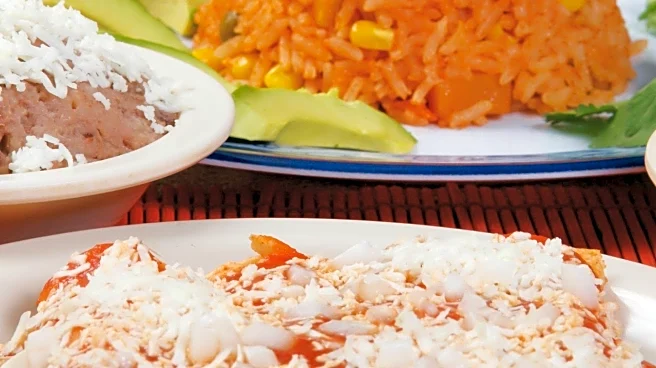What's Happening?
California is renowned for its diverse culinary scene, and a recent feature by the Los Angeles Times highlights 15 exceptional Mexican and Salvadoran restaurants across the state. Critic Bill Addison spent over a year exploring California's culinary landscape to compile a list of the best dining spots, emphasizing the state's rich offerings in Mexican and Salvadoran cuisine. The article showcases a variety of eateries, from popular establishments to hidden gems, each offering unique dishes that reflect the cultural heritage and culinary innovation of the region. Notable mentions include El Molino Central in Sonoma, known for its fresh masa and seasonal dishes, and Popoca in Oakland, which reimagines traditional Salvadoran recipes. Barbacoa Ramirez in Arleta is also highlighted for its expertly prepared lamb barbacoa, a weekend specialty.
Why It's Important?
The recognition of these restaurants underscores California's status as a culinary hub, particularly for Mexican and Salvadoran cuisine. This acknowledgment not only celebrates the cultural diversity and culinary talent within the state but also supports local businesses and chefs who are preserving and innovating traditional recipes. The highlighted restaurants contribute to the state's economy by attracting food enthusiasts and tourists, thereby boosting local tourism and hospitality sectors. Additionally, such features can inspire other restaurateurs to explore and innovate within their culinary traditions, further enriching the state's food scene.
What's Next?
As these restaurants gain recognition, they may experience increased patronage, prompting potential expansions or new culinary ventures. The spotlight on Mexican and Salvadoran cuisine could also encourage more culinary explorations and collaborations within the state. Furthermore, the growing interest in diverse cuisines may lead to more food festivals and events celebrating these culinary traditions, fostering a deeper appreciation and understanding of cultural diversity through food.
Beyond the Headlines
The emphasis on Mexican and Salvadoran cuisine highlights broader cultural and social dynamics, such as the importance of food in cultural identity and community building. These restaurants serve as cultural ambassadors, offering diners a taste of authentic traditions while also adapting to contemporary tastes. This culinary recognition can also play a role in preserving cultural heritage, as traditional recipes and cooking methods are passed down and shared with wider audiences.









